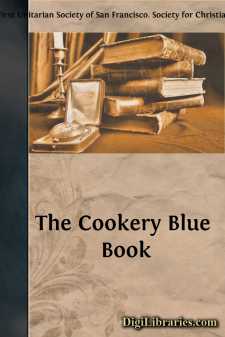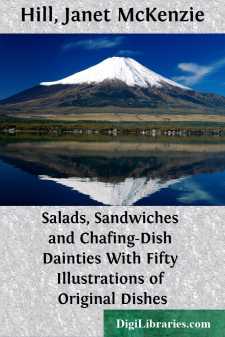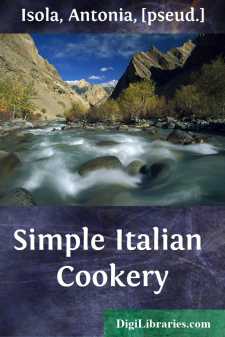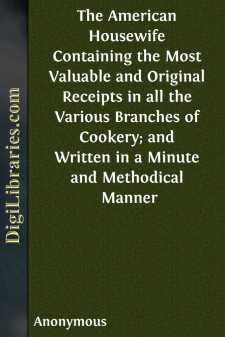Cooking
- General 70
- History 1
- Reference 10
- Regional & Ethnic 3
- Vegetarian 10
Cooking Books
Sort by:
COOKED FISH Canapés Cold boiled fish makes excellent canapés. To each half pint of fish allow six squares of toasted bread. If you have any cold boiled potatoes left over, add milk to them, make them hot and put them into a pastry bag. Decorate the edge of the toast with these mashed potatoes, using a small star tube; put them back in the oven until light brown. Make the fish into a creamed fish. Rub...
more...
HINTS FOR MEALTIME How often do we hear women exclaim, "Oh dear, what shall I have for the next meal?" This little book will aid you in answering that troublesome question. The recipes are carefully selected and we hope you will find them helpful. More important to you than the question of food is that of health. Therefore, in this book we show you many letters from women who have received great...
more...
INTRODUCTION Once upon a time there was a little girl named Margaret, and she wanted to cook, so she went into the kitchen and tried and tried, but she could not understand the cook-books, and she made dreadful messes, and spoiled her frocks and burned her fingers till she just had to cry. One day she went to her grandmother and her mother and her Pretty Aunt and her Other Aunt, who were all sitting...
more...
SOUPS. Bouillon Soup. 4 pounds of round of beef cut into dice pieces. Trim off all fatty skin. 4 quarts water; 1 teaspoonful celery seed; 4 large onions; 6 large carrots; bunch of parsley; 6 blades of mace; 16 whole cloves, salt and pepper to taste. Pour on the water, and let it simmer six hours, skimming carefully, for if any grease is allowed to go back into the soup it is impossible to make it...
more...
There is positive need of more widespread knowledge of the principles of cookery. Few women know how to cook an egg or boil a potato properly, and the making of the perfect loaf of bread has long been assigned a place among the "lost arts." By many women cooking is considered, at best, a homely art,—a necessary kind of drudgery; and the composition, if not the consumption, of salads and...
more...
INTRODUCTORY CHAPTER The true economy of housekeeping is simply the art of gathering up all the fragments, so that nothing be lost. I mean fragments of time, as well as materials. Nothing should be thrown away so long as it is possible to make any use of it, however trifling that use may be; and whatever be the size of a family, every member should be employed either in earning or saving money....
more...
by:
Helen Campbell
Introductory. That room or toleration for another "cook-book" can exist in the public mind, will be denied at once, with all the vigor to be expected from a people overrun with cook-books, and only anxious to relegate the majority of them to their proper place as trunk-linings and kindling-material. The minority, admirable in plan and execution, and elaborate enough to serve all republican...
more...
REMARKS ON BREAKFAST COOKERY. "Dinner may be pleasant, So may social tea;But yet methinks the breakfast Is best of all the three." The importance of preparing a variety of dainty dishes for the breakfast table is but lightly considered by many who can afford luxuries, quite as much as by those who little dream of the delightful, palate-pleasing compounds made from "unconsidered...
more...
by:
Antonia Isola
SOUPS BEEF SOUP STOCK (Brodo di Carne) 1 pound of round of beef 2 quarts of water 2 small, new carrots, or 1/2 of an old carrot 1/2 pound of beef bones 2 small potatoes 1 onion 1 tomato, fresh or canned Parsley Boil the beef, bones, and vegetables in two quarts of water over a slow fire—adding pepper and salt. Skim occasionally, and after two hours add two tablespoons of...
more...
by:
Anonymous
PRACTICAL COOKERY. 1. Observations respecting Meat. Meat to be in perfection should be kept a number of days when the weather will admit of it. Beef and mutton should be kept at least a week in cold weather, and poultry three or four days. If the weather is hot, it will keep but a short time. It should be kept in a cool, airy place, away from the flies, and if there is any danger of its spoiling, a...
more...











